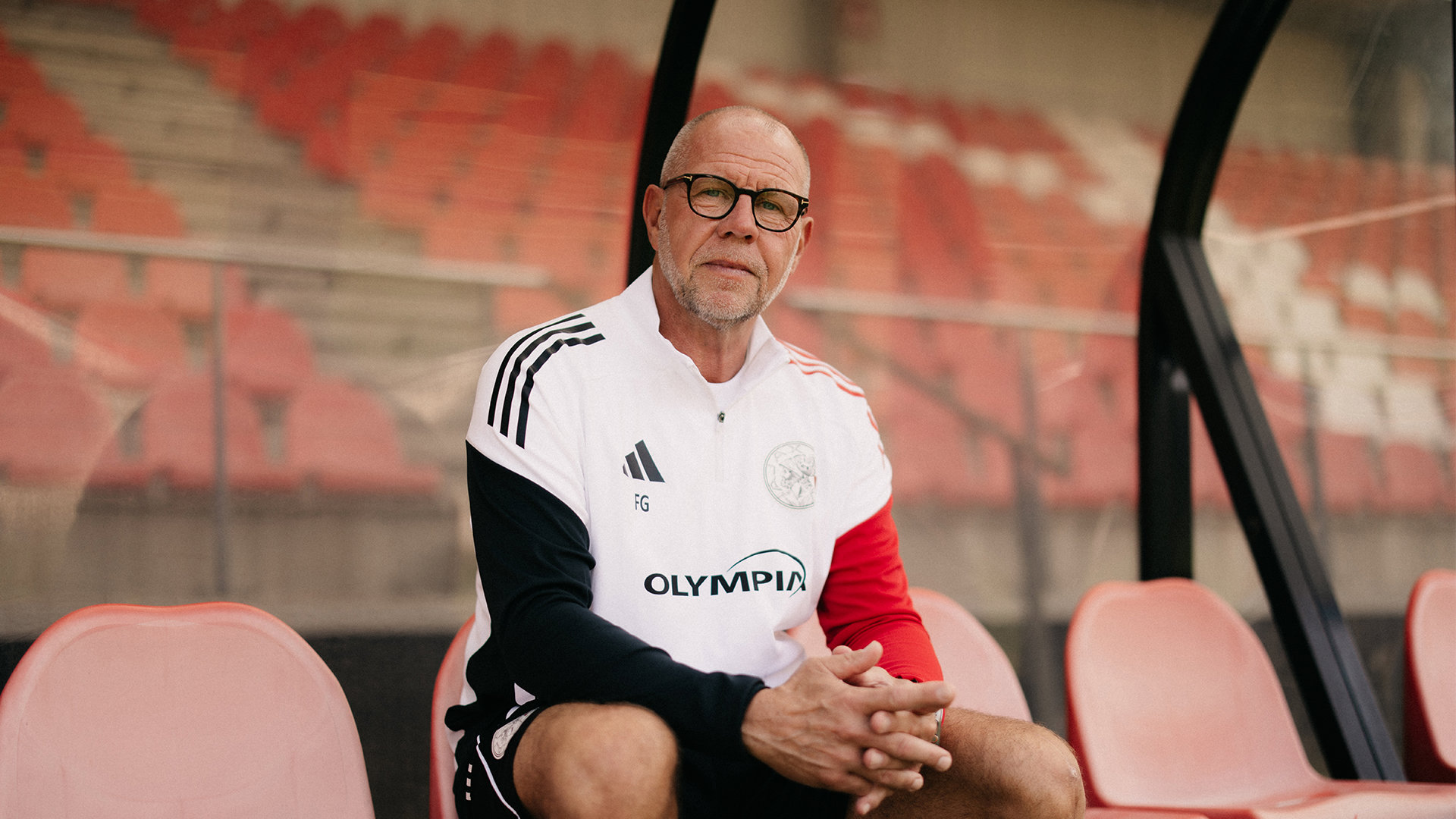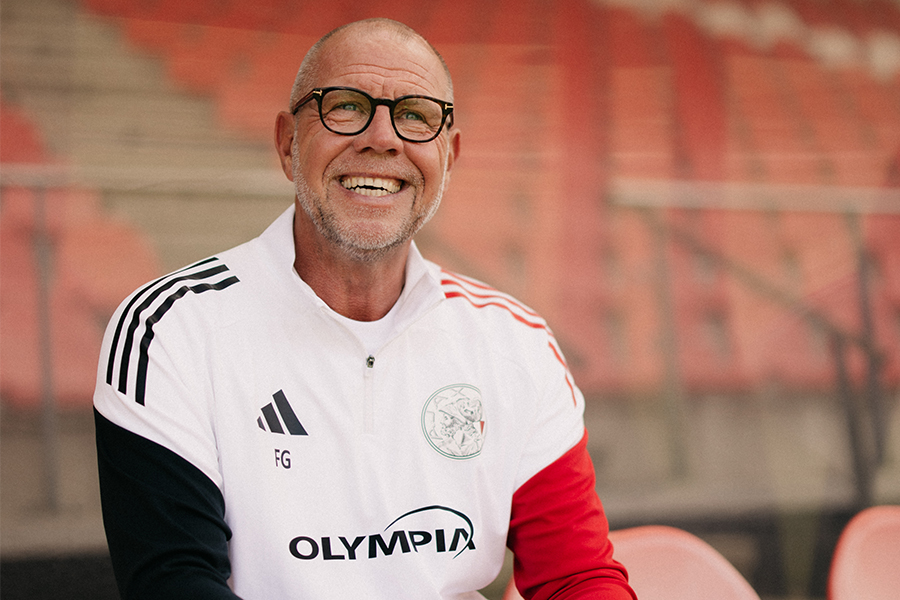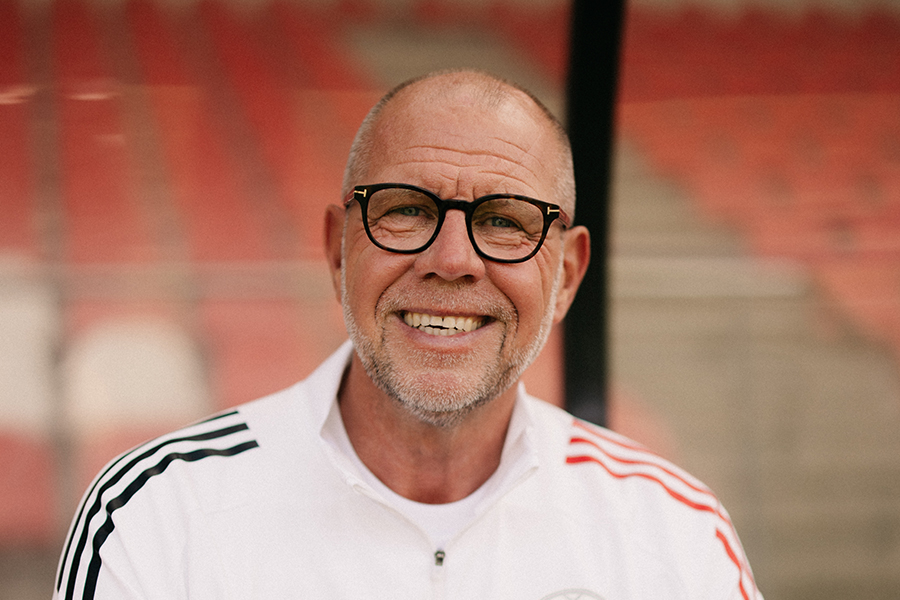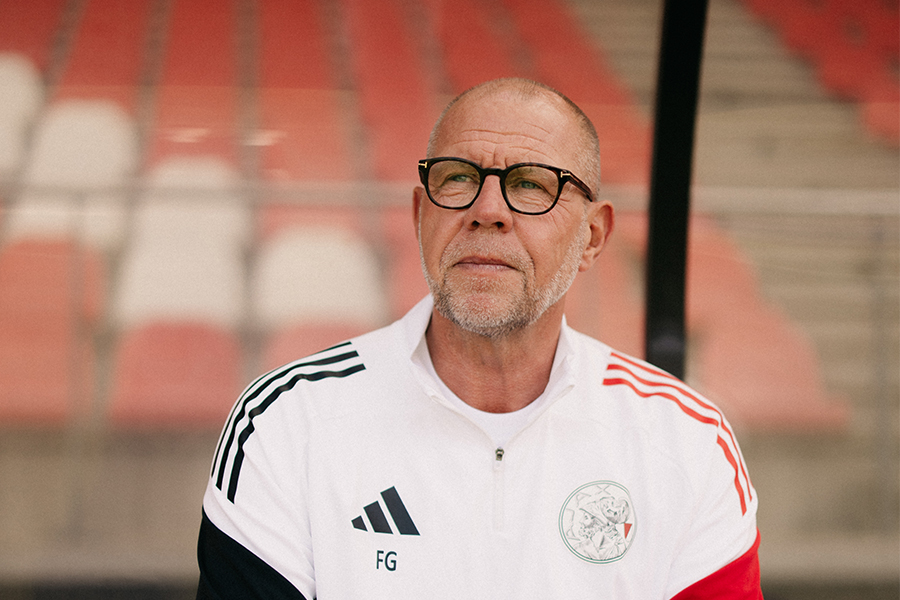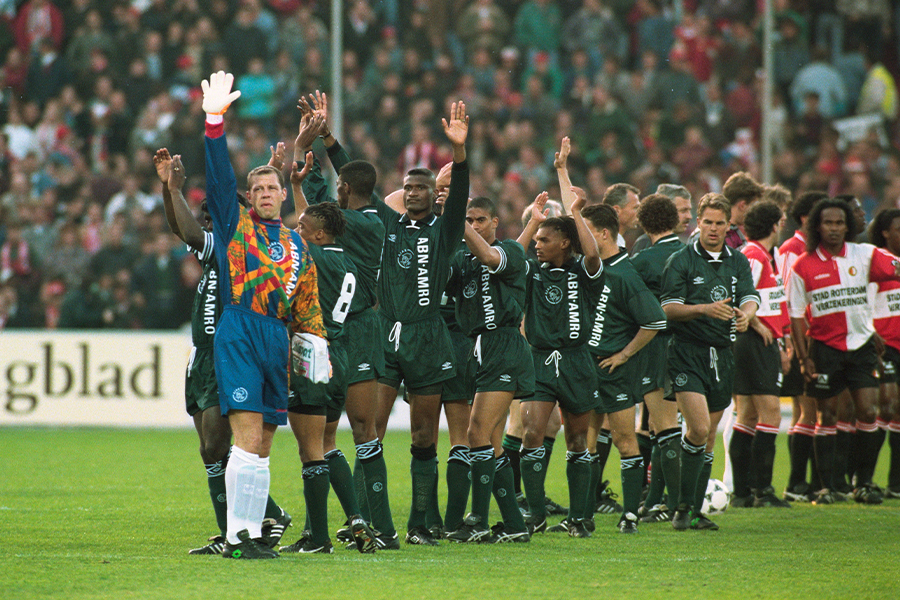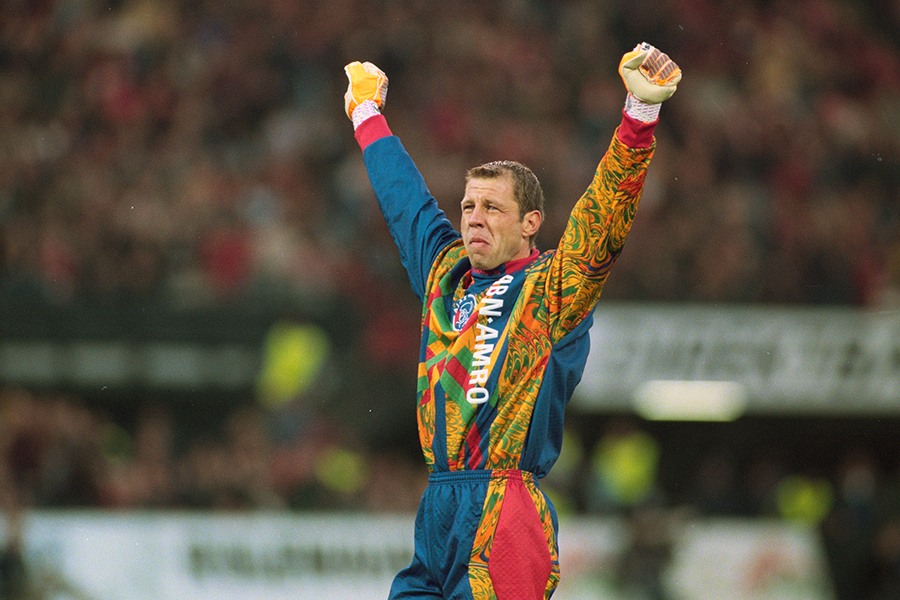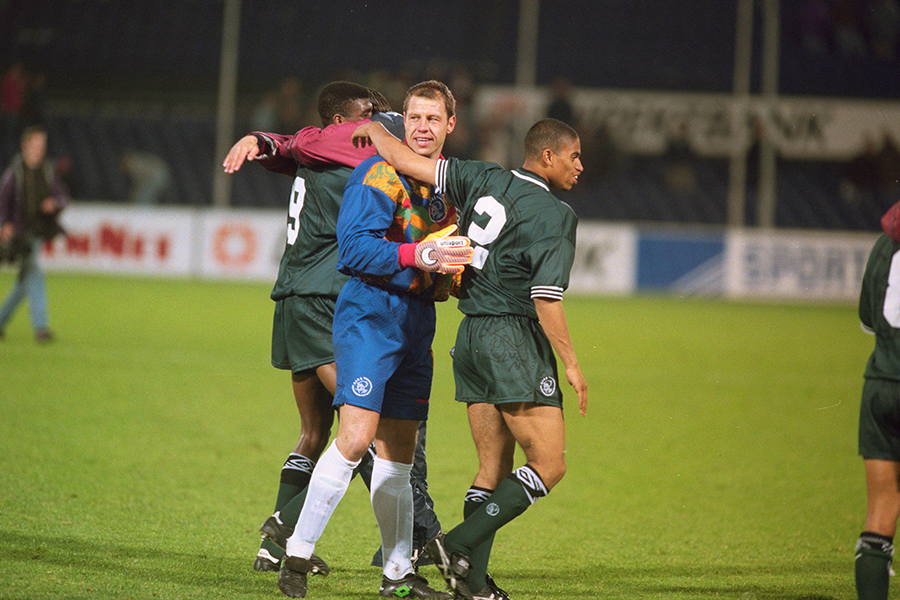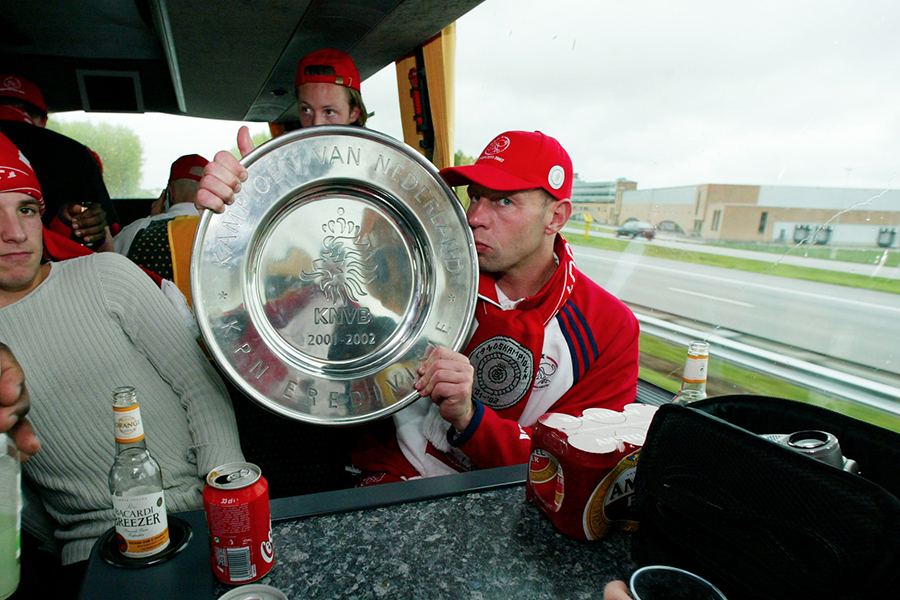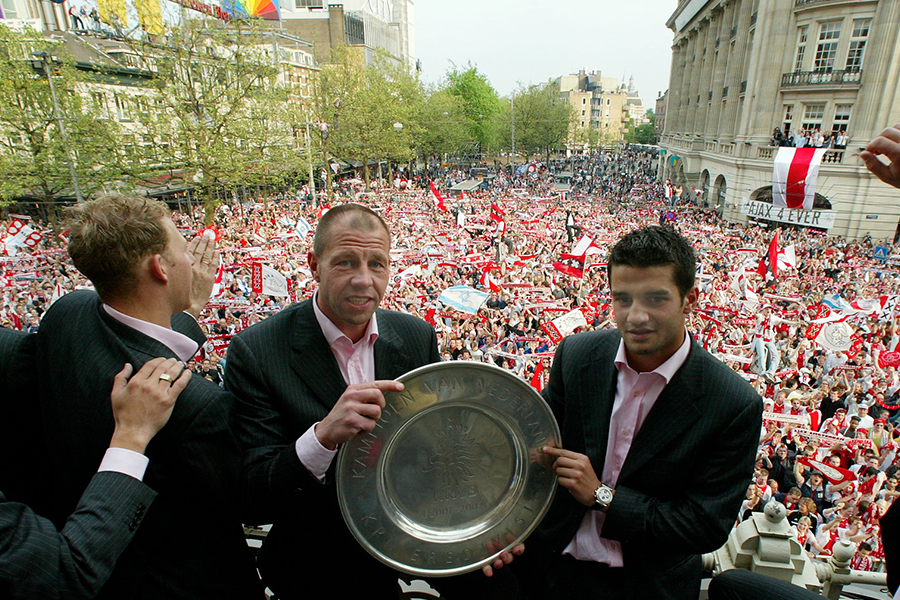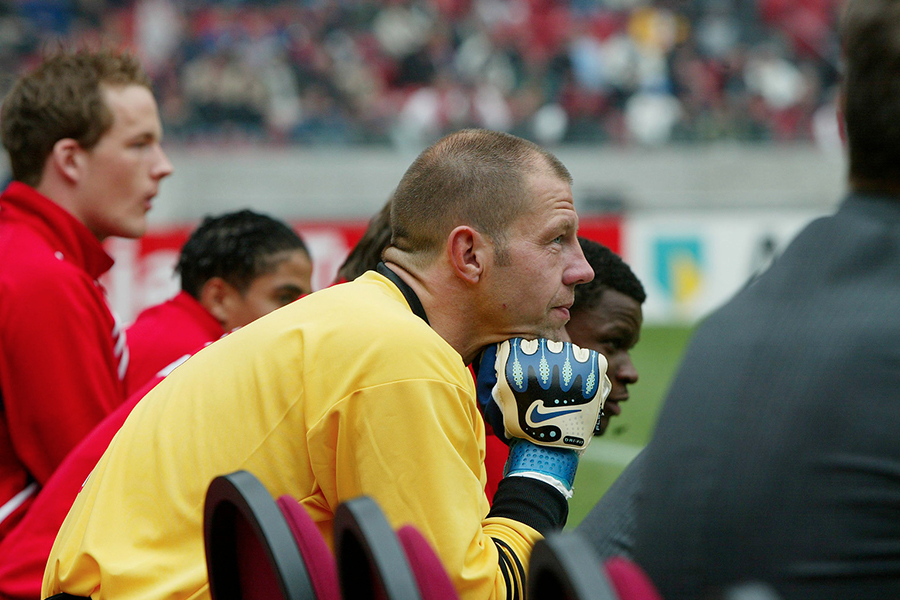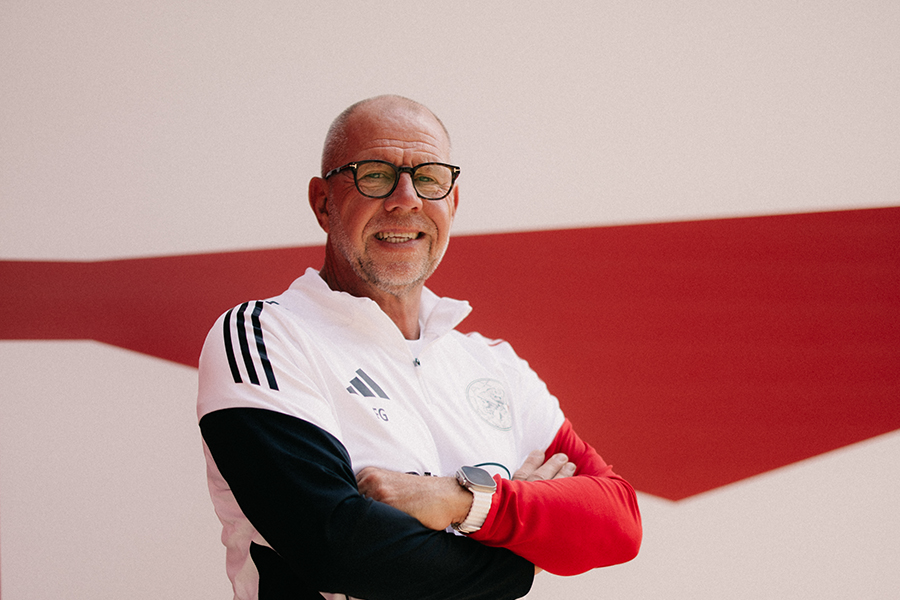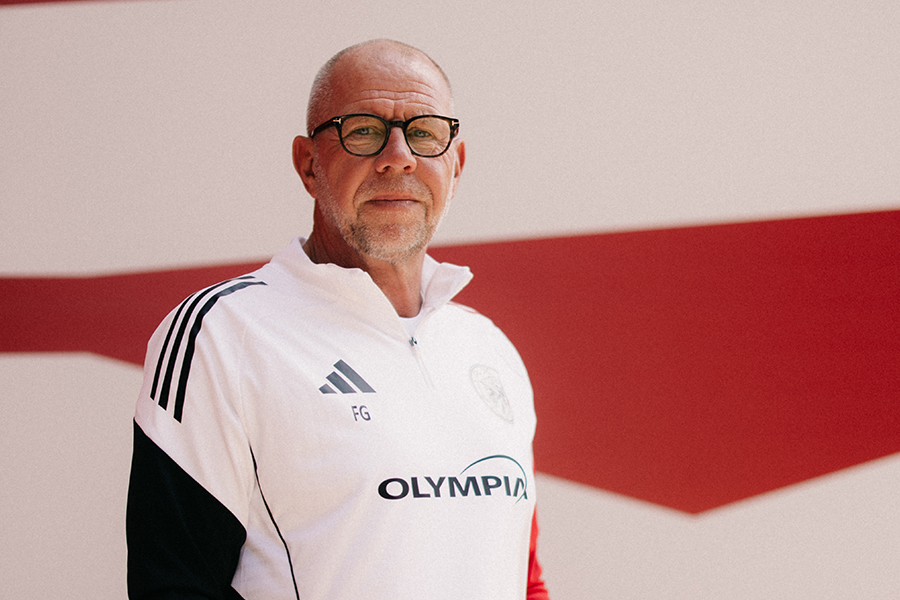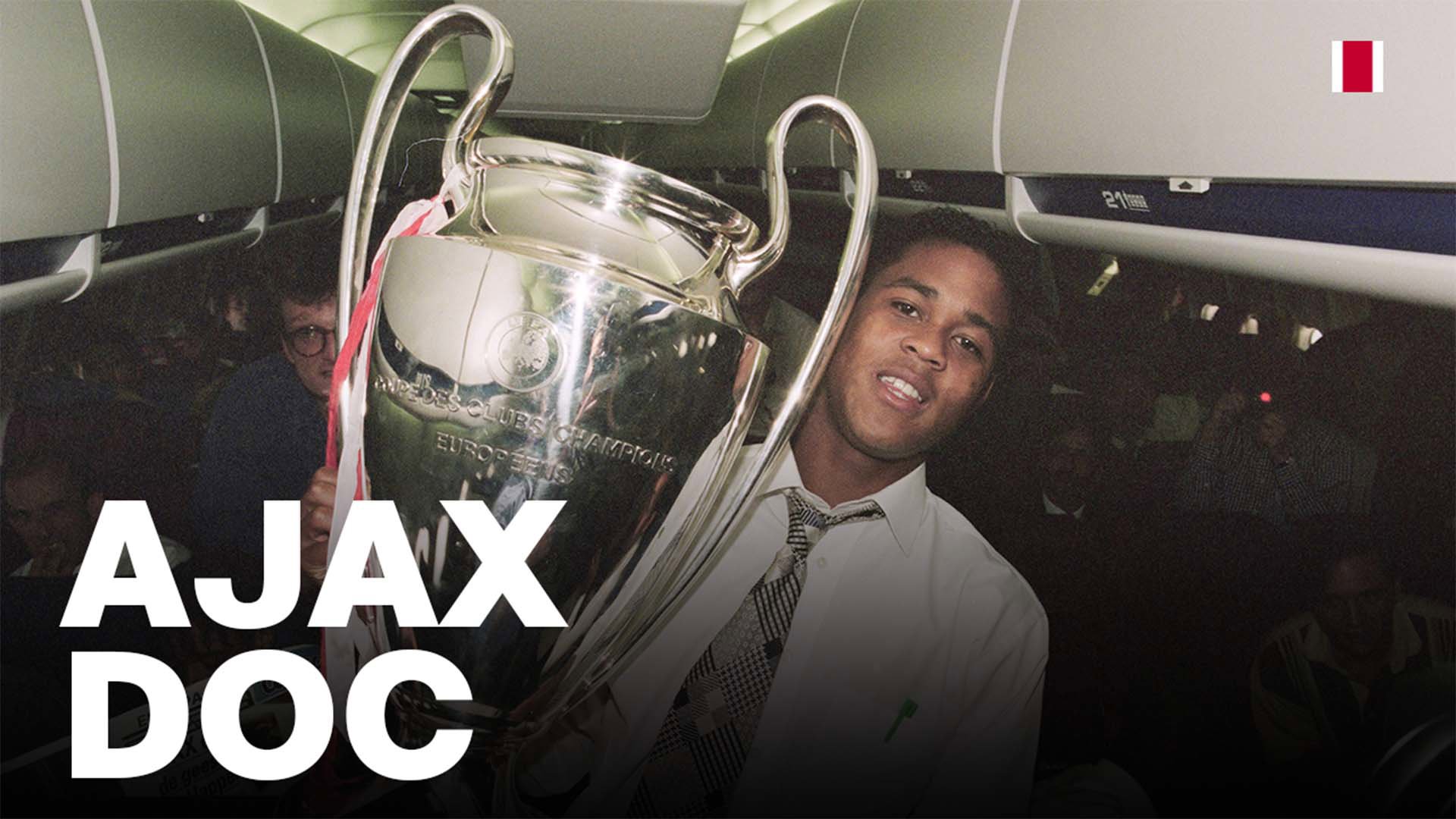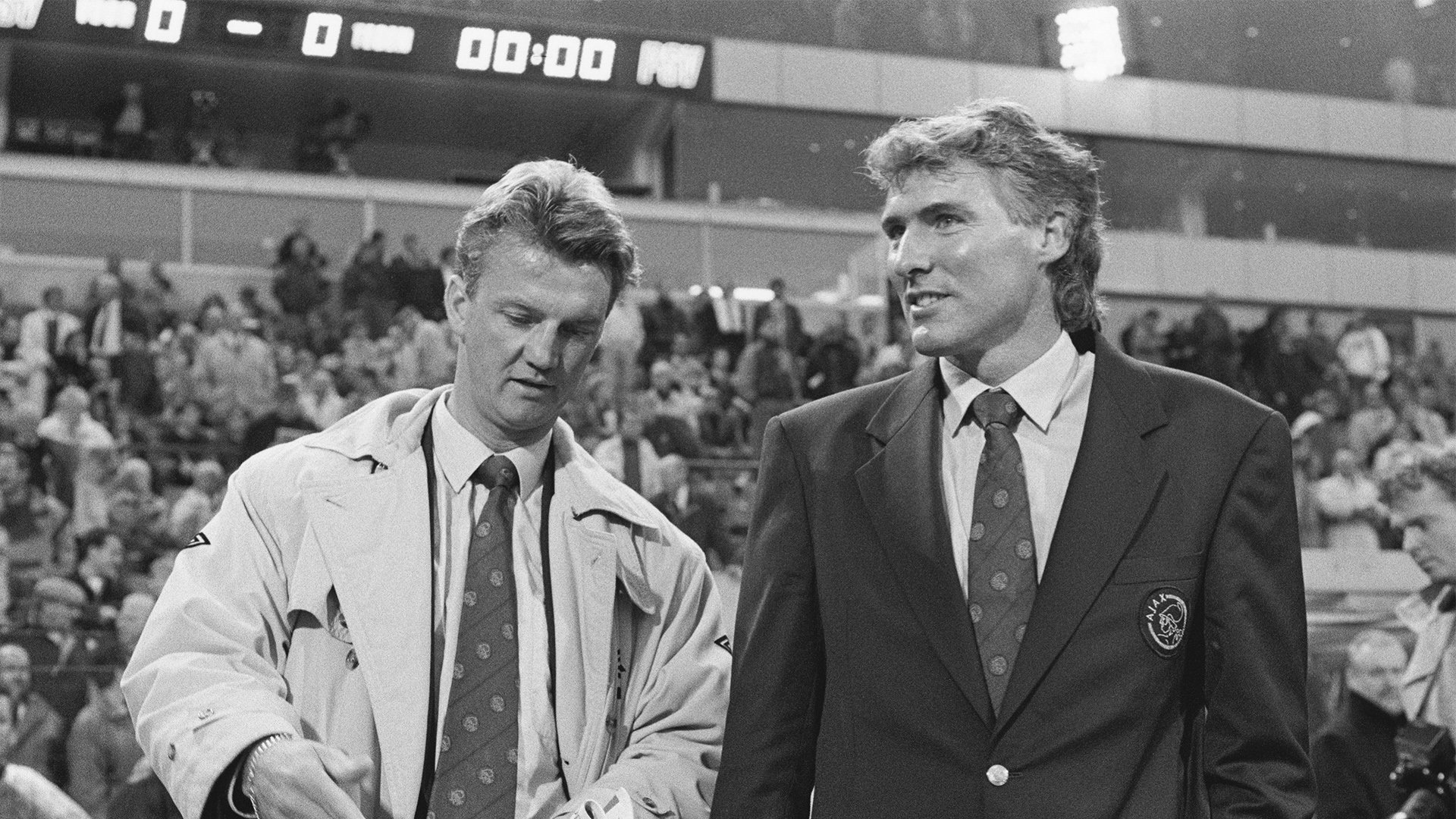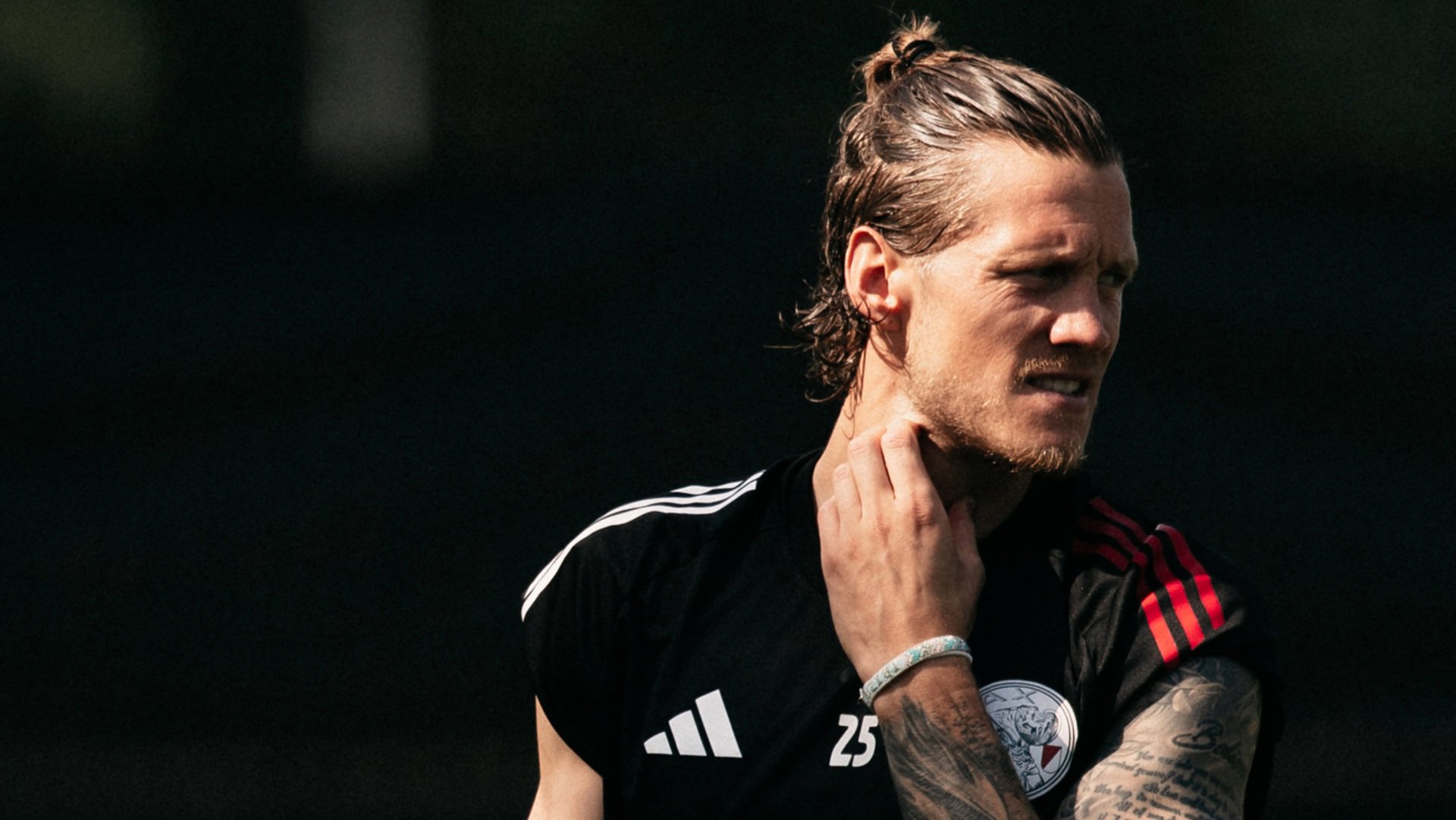On Sunday, August 17, the former goalkeeper will celebrate his 60th birthday. He still works with the same energy and drive at the club that has shaped his life and has run like a red-and-white thread through his football career: from young keeper to his current role as Head of Coaches at the youth academy in Amsterdam.
To mark his sixtieth birthday, we look back with Grim on the various periods he has spent in Amsterdam. What has he experienced? Who has he learned from? Which lessons does he still apply in his current work? In the boardroom at De Toekomst, his workplace, he reflects on his Ajax life and explains where his focus lies today.
First of all: congratulations, Fred. Wishing you many happy returns. Let’s go back in time. Some 45 years ago, you walked into Ajax as a fifteen-year-old goalkeeper, scouted by Aad de Mos. How do you look back on that now?
"I was born and raised in Amsterdam. As a young boy, I was already a supporter of the club. In the 1980/1981 season, I was invited to come to Ajax. As a young lad, I was as proud as a peacock. I joined the B1 squad, now known as Ajax U17, moved up to the A1, and eventually reached the first team."
"As a child, I played football a lot in my free time. I was signed up for JOS in Amsterdam. The season had already started, but I was able to join a nice team with many friends. I ended up in goal then. I didn’t mind at all, in fact, I enjoyed it right away."
So you became a keeper by chance?
"Call it chance, call it luck. I sometimes say the same thing now to youth players at De Toekomst: you also make it happen by putting yourself in the right place. It was meant to be."
A goalkeeper who can play football well, that fits the Ajax philosophy.
"At first, I trained with the first team under Aad de Mos, Spitz Kohn and Hassie van Wijk. In 1985, Cruijff came to Ajax 1. He wanted goalkeepers in his squad who were comfortable on the ball. Stanley Menzo was a perfect example of that, and he also saw those qualities in me."
"At that time, it was becoming increasingly important for goalkeepers to be able to play out from the back. We could set ourselves apart because we were comfortable on the ball, both left- and right-footed, and were confident playing passes to team-mates. We also played high up the pitch, behind the defensive line, far from the goal, sometimes almost on the halfway line. That was unheard of back then."
"After my first spell at Ajax, I went to Cambuur, under Fritz Korbach. He also always wanted to play attacking football. In my first match in the First Division against Willem II, I intercepted a ball near the halfway line. That was considered very spectacular at the time. Back then, goalkeepers still stood, figuratively speaking, 'chained to the post'. But I’ve always been that kind of sweeper-keeper, even when I was eleven or twelve years old."
Did you know from your time in the B1 at Ajax: I’m going to make the first team?
"That feeling actually always came from Ajax as well. They were happy with my performances, and I kept taking the next step up. Until the moment Menzo came over from Zeeburgia. He was a year and a half, two years older."
"Stanley was doing really well, and Cruijff rated him, partly because of his ability on the ball. At that point, I had to step aside. He was in goal, and I was on the bench. But I wanted to get game time. Then Cambuur came along halfway through the 1986/1987 season."
Were you ready for that?
"Yes. I really wanted to play, but the club actually didn’t want me to go out on loan. I had little prospect at Ajax. At Cambuur, the stadium was full every week. That appealed to me."
Until Ajax, in the person of Van Gaal, came knocking again in 1994.
"Yes, Van Gaal was very clear. He said: We have a young, talented goalkeeper in Edwin van der Sar. We have great faith in him, but we don’t know how he’s going to develop. I want a goalkeeper behind Edwin I can rely on blindly."
Had you still counted on Ajax by then?
"Not really. I had played for 7.5 years at Cambuur. I always signed for one year because I had the ambition to take a significant step forward in my sporting career. At that time, the Bosman ruling didn’t exist yet, and you couldn’t just leave after your contract ended. If I’d been a free agent, my path might have looked different."
"I had a fantastic time at Cambuur. Just before Van Gaal called, I had signed my first three-year contract. Two or three weeks later, Ajax came in. Cambuur received a nice transfer fee, and I could return to the highest level. Looking back, an excellent choice."
You landed on your feet that season…
"Yes, but of course you didn’t know at the time that we’d go on to win the Champions League. We didn’t know we’d win the Super Cup or the Intercontinental Cup either. Nobody knew that. It was great to step into that team, but that success was something we achieved together."
You once said about that period: "At Ajax, I had all the ingredients for a good meal, just not the dessert." What did you mean by that?
"I can still remember that. At Ajax, everything has always been well-organised: the facilities are top-class, and the equipment is good. If you’re a consummate professional, it’s fantastic to have everything arranged so well. I still sometimes look at the current situation at De Toekomst. Compared to other clubs, the opportunities and facilities here are truly excellent."
"I noticed that too when I joined Ajax back then. I valued it highly: training with good balls, on good pitches, with quality coaches and players around you. But I only got one dessert a year."
The 0–5 in De Kuip in May 1995?
[Laughing] "That wasn’t bad. I could live off that for a whole season. That match was wonderful. It was also a credit to Van Gaal and his staff that they dared to let us play, and that a week before the Champions League final, too."
"As reserves, we were determined to prove ourselves. In a packed Kuip, against Feyenoord’s first team. It sounds like it was a walkover, but I had to make quite a few saves that day. I thought then: this is what I’ve worked so hard for all year. As a substitute, you often had to work harder than a starter."
How do you mean?
"The starters had the matches, which is great for them. As a sub, you had to make up for the work you missed on the Monday after the game. We always had to be focused. You were constantly busy with it, without often getting a reward. Van Gaal would regularly have us play for Ajax 2 on Monday evenings. Afterwards, we’d go straight to the training camp in separate transport to prepare for the Champions League match on Wednesday. You shouldn’t underestimate that. You could never sit back."
Did you learn a lot as a substitute from Van Gaal and from the moments you sat next to him on the bench?
"In my first year at Cambuur, I started my coaching course. At 21, I already knew I wanted to become a coach. When I was on the bench at Ajax, I thought: Let me sit as close to the staff as possible, so I can listen, watch, and take advantage of that. I was also a vocal player on the pitch. On the bench, I was just as engaged. I think it was in the Champions League match at home against Bayern Munich that you can see me standing on the touchline coaching the team."
Was Van Gaal pleased with your input?
"He told the group several times: take Fred as an example. He always gives one hundred per cent. That gave me a kick and a boost; I felt seen. Of course, I also had moments where I thought: I want to play."
"In 1998, I was even selected for the Dutch national team, as Ajax’s reserve keeper. Guus Hiddink said I was a good goalkeeper and used to my role. It’s also a skill to be able to step in immediately when needed. I took that as a big compliment."
In 1999, Edwin van der Sar left, and you took your place between the posts.
“Replacing the goalkeeper of the Dutch national team is quite a task. On top of that, a lot of players left Ajax. That was a tough year.”
You also had some big boots to fill…
"Yes, and the Amsterdam crowd back then wasn’t quite like it was last season. But eventually, I found my rhythm. I was able to become important to the team. We still played some good matches in Europe, and in 2002, we ultimately won the double."
That year, you were also voted the most popular Ajax player.
"Yes, that stroked my ego. It was my last season as a player. To finish with a year like that is something I would wish for anyone. I had a beautiful send-off in the ArenA, with two trophies to my name."
Then your coaching career began. What did you learn from the managers you played under yourself?
"Van Gaal had the greatest influence. Of course, Cruijff too, but Van Gaal had the biggest impact on my coaching career."
In what way in particular?
"In how you deal with each other, the human-to-human principle. But also in the agreements you make with the team and staff. And in the style of football: what you find important, what you want to see. The best compliment for me was when people said: 'When I see this team play, I see a Fred Grim team.' That’s the confirmation that what you train comes back in the match."
You started as a goalkeeping coach at Ajax. Was that a deliberate choice?
"To be honest, I was steered in that direction a bit at the time, in a positive way, mind you. Leo Beenhakker saw a career for me there. But I quickly realised it was too limited for me."
"I started shadowing youth teams, including in the upper age groups. In 2004, I joined Ajax U23 alongside John van den Brom. In 2006, I returned as goalkeeping coach with Ajax 1, partly because I found the staff with Danny Blind, Van der Lem and Ruud Krol very interesting."
"After that, I became an assistant coach at Sparta with Gert Aandewiel. Ajax came calling again, and I took charge of Ajax U23. When Frank de Boer moved from Ajax U19 to the first team, I took over the U19S. Many of those boys went on to play professional football."
"Then came Almere City, which we built from the ground up, Jong Oranje, and the senior national team, where, after Danny Blind’s dismissal, I took charge for three internationals as head coach. After that came RKC, with whom I won promotion, and later Willem II and FC Emmen."
What’s the difference between coaching Ajax U19 and, for example, RKC?
"With U19, you have to perform and teach the boys to win, but player development is the most important thing. The academy is the club’s lifeblood."
"At some clubs, you know it’s not realistic to win every week. But even there, it’s important to make the players better."
You’re now Head of Coaches at the Ajax Youth Academy. Does that role suit you?
"I think so. I always want to help make each other better. As a coach, you want to improve your team, but it’s just as important to develop your staff. If you make the staff better, the players will automatically improve as well."
"Through my work at different clubs and with Jong Oranje, I’ve learned a lot about improving the staff. That’s what I work on every day now."
What does that role look like in practice?
"It’s a broad role. I watch a lot of training sessions, attend pre- and post-match talks, and conduct match analyses. I also watch interviews back to see what coaches say and how they present themselves. And the coaches know they can come to me in confidence. That’s why they often come with questions. Since I arrived, my role has grown steadily, which shows the trust the club has in me."
And all that at the club you first joined as a fifteen-year-old…
"Ajax runs like a white-red-white thread through my life, as a goalkeeper and as a coach. I’m thrilled to be working here at Ajax."
